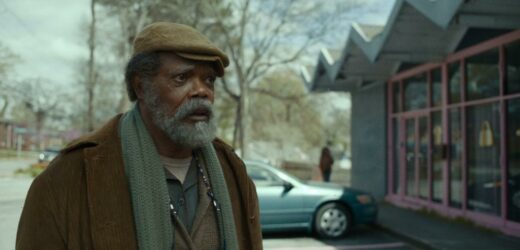The eyepatch may be gone, but Samuel L. Jackson is still playing the hero. In The Last Days of Ptolemy Grey, Jackson—best known for playing the one-eyed Nick Fury in the Marvel Cinematic Universe—plays a reclusive old man with dementia who is given a miracle drug to help him remember his past. Though the cure is only temporary, Ptolemy uses the brief respite from his impairment to investigate the death of his nephew Reggie. Here, the actor explains how it took so long to adapt the popular Walter Mosley book of the same name into an Emmy-worthy limited series for Apple TV.
DEADLINE: This is such a poetic mood piece. Have you ever played anyone like Ptolemy Grey before?
SAMUEL L. JACKSON: It’s been a long time since I’ve done a piece that has dramatic quality and requires me to call on the acting things that I learned when I was in theater. So yeah. It’s been a while, but yes, I have.
Related Story
Samuel L. Jackson Joins Chris Pratt In Alcon Entertainment's 'Garfield'
DEADLINE: How long has this been in the works?
JACKSON: For like 10 years or so. I met Walter Mosley at a couple of other places when he was doing some of his other novels or you know, just being around New York. But since we started trying to do this, we’ve been in contact with each other and trying to get this done for over 10 years. So yeah, we’ve known each other for a while. I’ve always liked his writing, so why not?
DEADLINE: Why did it take 10 years? Was it hard to find a buyer?
JACKSON: It was sitting in one place for a while, but they kept trying to figure out how to make it into a 90-minute, hour-and-45-minute movie. I was against it, so I never signed off on any of those. The scripts that we got left out too much. It’s a full story about somebody’s life. It’s hard to tell that in an hour and 45 minutes.
DEADLINE: It was such a beloved book. Were there any worries about doing it justice for the screen?
JACKSON: You never know. Novels, like I said, are dense. I was a little worried at first that even six episodes wouldn’t be enough, but we figured out a way to make that happen. I would’ve preferred eight in my mind. All the people watching it were very sad that it was coming to an end. There are parts that we had to lose or abbreviate in a way so we could make it work. But overall, I’m pleased with what we got.
DEADLINE: The title certainly kind of gives the ending away. Why do you think it still works?
JACKSON: I mean, we’ve seen other things about people who were dying or they’re dying, and you end up going back and doing flashbacks of their life or whatever. So that’s not a hard thing. At one point, the people at Apple were worried about the mystery element and they were like, “can we play that up?” I said, “Everybody kinda knows who did it. So, I don’t think we gotta hide that from people.” So other than that, no, I wasn’t concerned about that. We tell the story and make ‘em fall in love with the people on the inside of the story. That’s how you do it. We had great people, and everybody was committed to the project in terms of how it was going to play out and who their characters were.
DEADLINE: How do you prepare to play a man with dementia?
JACKSON: I remember the people who I know who had it and what I saw when I was dealing with them, then trying to put myself in that place. I think that gave me sort of a leg up in terms of what I was trying to do or where I was trying to be in terms of what my face looked like or being lost in my own world or being alone. Some of my favorite parts are the moments where Ptolemy is by himself, and he’s trying to figure out what’s going on or who he is or why he is sitting there, eating those beans.
DEADLINE: In one of the episodes where Ptolemy is about to get the miracle treatment for his dementia from Dr. Rubin [Walton Goggins], we see a Black couple in the waiting room. Do viewers learn that this trial drug is used only on people of color?
JACKSON: I don’t know if we find that out, but in my mind, I’ve always assumed that Walt Goggin’s character works for some unknown pharmaceutical company. And I think that he does go to clinics, not necessarily in the Black community, but you know, more than likely in the Black community where people are being treated for various things like diabetes and cancer. And there’s a drug that company has for everything that they’re experimenting with, and they’re using them on poor people and people of color, for sure. Then they pay for their bodies when they’re dead so they can examine what that drug did to them. In the book, Ptolemy is not supposed to live longer than a week and he ends up living longer because he’s a very strong person for some reason, or genetically something works for him that didn’t work for everybody else. He’s just one of many people who is being experimented on by whoever that pharmaceutical company is.
DEADLINE: This movie reminded me of the 1990 Awakenings, which was so good, but also so sad. If you were to suffer Ptolemy’s fate, would you be willing to take a drug that temporarily restores your memory?
JACKSON: Of course. Everybody would love to have another chance to go back and fix the things that they know can be fixed. I think about that sometimes. I don’t know. There are a couple people I wish I’d never met, but otherwise I’m OK.
DEADLINE: Dominique Fishback is so good as Robin, the young woman who ends up looking after Ptolemy. What was she like to work with?
JACKSON: She’s very studious and intense. I knocked some of that intensity down by saying “look, we’ve got to have some fun here. Don’t worry about getting this all right. It’ll get right. Because we have a relationship that works.” Off camera, I enjoyed her company and the kinds of things that she was bringing, like a 28-page PowerPoint presentation of who Robin was. [He laughs]. I tried to allow her to be herself, to allow the natural joy of coming to work every day and having a job. I said, “Look, we don’t get to act all the time. So, when we have it, we’ve got to enjoy it, embrace it and not get bogged down in the minutiae.” I think we accomplished that.
DEADLINE: This could make a cool series about a man with dementia, kept alive and kicking with this mysterious drug, who goes on to solve crimes.
JACKSON: Well, I mean, the book is the book, but yeah. People are definitely clamoring for “you know, he’s not dead. Let’s just see if the doctor comes back with more drugs for him.” There’s stuff to be mined from that, for sure.
DEADLINE: Ten years. That’s a long time to wait for this. Was it everything that you’d hoped for?
JACKSON: It is. I’m one of those people that looks at what people are saying online. So, in real time, I was like going through Twitter and looking at how people felt about the series. So yeah, it felt worth it. The reward was great. People’s comments were really kind and really involved. Some people got a little triggered by that first episode because they have relatives who are affected [with dementia]. I just hope they stick with it. Right. If you get through the first episode, you’ll be OK. It gets a little lighter.
Must Read Stories
‘Lightyear’ Fires Up $5.2 Million In Previews; Eyes $70M-$85M Opening
Chris Rock & Dwayne Johnson Approached About Hosting Emmys As Producers Aim High
‘Top Gun: Maverick’ Is Tom Cruise’s Biggest Movie Ever, Flies Past $800M Global
Nicole Kidman Leads Thriller Pic ‘Holland, Michigan’ For Amazon Studios; Mimi Cave Directing
Read More About:
Source: Read Full Article








